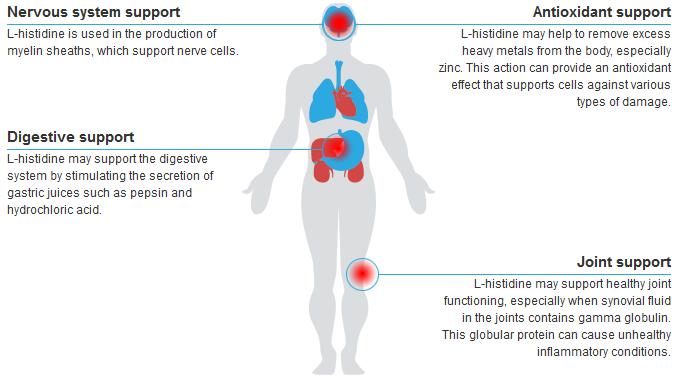L-histidine, an essential amino acid and precursor for histamine, anserine, and carnosine, plays a crucial role in localized immune responses and supports healthy inflammation management, digestive function, antioxidant activity, and joint health when supplemented as L-histidine HCL.
L-histidine is an essential amino acid, meaning that it must be obtained through dietary sources. It is also one of the 23 proteinogenic amino acids, which are used to synthesize proteins. L-histidine is a precursor for histamine, which plays an essential role in localized immune responses. It is also the precursor for other important organic compounds such as anserine and carnosine.
The German physician Albrecht Kossel discovered histidine in 1896. Histidine was first thought to be an essential amino acid only in infants, but a 1975 study showed that it is also essential for adults. Humans can biosynthesize small amounts of L-histidine, but this quantity falls short of nutritional requirements. Animal protein such as meat and dairy products are the best dietary sources of L-histidine. Cereal grains such as rice, rye and wheat also have significant levels of L-histidine.
L-histidine has an imidazole side chain, which is the source of much of its biochemical activity. This location is the catalytic site for certain enzymes and is also used to synthesize metalloproteins. L-histidine is also important in blood chemistry, since it is involved in stabilizing oxygen-bound hemoglobin and destabilizing carbon monoxide-bound hemoglobin. L-histidine is commonly sold in the form of L-histidine HCl, which is the hydrochloride salt of L-histidine. This salt is typically prepared by using hydrochloric acid to neutralize L-histidine.
L-histidine HCL is commonly used in health supplements to aid with inflammation management. It is also used to support the digestive system and provide antioxidant activity.
L-histidine is used in the production of myelin sheaths, which support nerve cells.
L-histidine may support the digestive system by stimulating the secretion of gastric juices such as pepsin and hydrochloric acid.
L-histidine may help to remove excess heavy metals from the body, especially zinc. This action can provide an antioxidant effect that supports cells against various types of damage.
L-histidine may support healthy joint functioning, especially when synovial fluid in the joints contains gamma globulin. This globular protein can cause unhealthy inflammatory conditions.

A low hemoglobin level and red blood cell count are some of the most common signs of a low L-histidine level. An L-histidine deficiency is also associated with age-related joint conditions, including stiffness and discomfort. Additional signs that you may need L-histidine supplements include nerve deafness and an imbalance of intestinal flora. You may also need L-histidine if you suffer from oxidative stress, which often causes visible signs of aging.
L-histidine base, histidine
Shipping calculated at checkout
